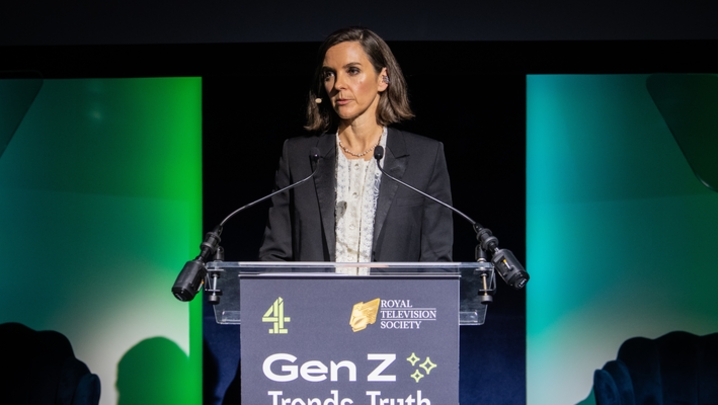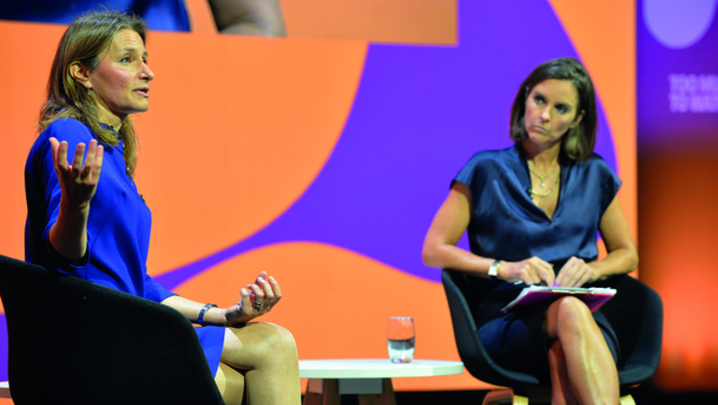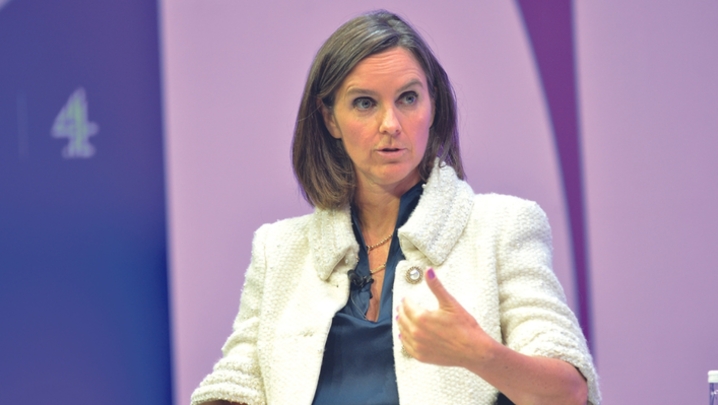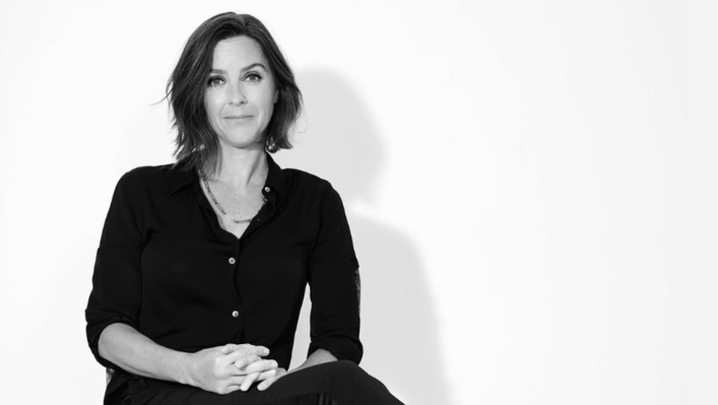Alex Mahon, the broadcaster’s CEO, praises the UK’s indie sector for riding to the rescue in lockdown
They say that times of crisis often bring out the best in people and organisations. For an example of this, look no further than how Channel 4 has adapted to postponed productions and an alarming fall in advertising over the past six months.
“In a crisis, when you have to change really fast, Channel 4 is actually amazing,” the broadcaster’s CEO, Alex Mahon, told Tim Hincks, co-CEO of Expectation, at the RTS’s Digital Convention.
As lockdown took hold in March, almost overnight around 1,000 members of staff began working remotely. “We were prepared with the technology. We had a debt facility in place for a market shock. That helped,” she recalled. “We had to make a plan to cut costs fast.
“We had a clear, strategic conversation about what the editorial response should be, led by Ian [director of programmes Ian Katz] and the commissioning team. What did we want to say to the nation and what did we think our position was?
“It was clear to us that we should say something back to Britain about what was happening. It was the exact opposite of what the SVoDs would be doing. If you were watching Netflix, it would be Tiger King, which was not saying anything about Britain or the pandemic. Tiger King didn’t bring people together to face an unseen enemy.”
With adverting revenue falling dramatically, Hincks asked if the beginning of lockdown was a scary moment? “Yes, it was pretty bad.… In the worst months, advertising dropped 50%. To have 50% of your revenue ripped away and not know how long that would last was bad.”
Fortunately, despite a hefty cut to the content budget and furloughing around 100 staff, Channel 4’s commissioners and the UK’s indies rose to the occasion. Innovative, fast-turnaround shows, such as Grayson’s Art Club and Jamie: Keep Cooking and Carry On, soon found an audience as people, unable to leave their homes, needed diversions.
“Indies did incredible things and produced things cheaply,” said Mahon, who claimed that Channel 4 was more in tune with the nation’s mood than its rivals were.
Viewers, particularly the under-35s, flocked to Channel 4, including to the highly regarded Channel 4 News. The number of young people watching Krishnan Guru-Murthy, Cathy Newman and Jon Snow increased by 79%, according to Mahon.
It also helped that, back in the early spring, Channel 4 had planned for the worst possible financial scenario, which, in the event, didn’t happen – “so we are up compared with where we thought we’d be”.
Further lateral thinking was required to film its flagship show, The Great British Bake Off, a tent pole of the autumn schedule. Love Productions created “a self-contained biosphere” for the six-week shoot – in other words, baking in a bubble. Last month, Bake Off gave Channel 4 its highest audience since 1985, as an average of 10.8 million people tuned in.
As for the next six months, Hincks asked whether the broadcaster could maintain its programme budget. Did Channel 4 have the resources to allow those programmes to continue or will we see a chipping away and producer’s tariffs going down?
“The programme budget will go up massively next year because we’ve had to cut it so much this year,” replied Mahon. “It’s not clear yet how much of the £150m we took out [from a total of £650m] will go back in, because we don’t know what the advertising market will do.”
She continued: “There’s also a bit of a concertina effect because of things that have been delayed.… We’ve got to get tariffs back to normal rates. We can’t survive, and neither can indies, with tariffs being low.
“Lockdown has definitely taught us some things about how we can make cheaper programmes and it’s definitely taught us some things about how we can make faster decisions.
“But you can’t compete in a Netflix world or an Amazon Prime world or a Disney+ world by just making everything cheaper. It’s not realistic, because that’s not the quality that viewers demand and it’s not an option that producers have.”
Noting that the BBC’s new Director-General, Tim Davie, has said that the BBC may produce less in future, would it be better for Channel 4 to make fewer shows in order to push tariffs back up?
Mahon stressed that, in such an uber-competitive landscape, audiences demanded big shows such as Bake Off and Gogglebox. “We’ve been seeing that trend for years but, equally, we’ve been seeing new stuff as well.”
For new shows, marketing – often on social media – was critical for Channel 4, with a younger audience than the other British public service broadcasters. Mahon highlighted a recent deal with social network company Snap, which involves cut-down versions of 300 shows on Snapchat’s Discover platform. “They will have a reach of five, six, seven million [people],” predicted the CEO.
Hincks turned his attention to competition from the SVoDs. Could Channel 4 compete on scripted content with Netflix et al? “You can’t compete at the same budget point.… but you can definitely compete on new writers, new directors and on new and important work.” Mahon cited two upcoming dramas as examples of Channel 4’s commitment to new work: Adult Material (see page 30), focused on a woman who works in the porn industry, and Russell T Davies’s latest series, It’s a Sin, set during the 1980s Aids pandemic.
“I don’t think the streamers would make them. They wouldn’t find the people to do them. We’ve got to keep doing that because this is what stimulates the new work in the industry and early-stage writers.… The streamers are looking for stuff that’s much more global or [written by] proven writers. There’s a space for us, but it’s not easy to compete with them.” But, probed Hincks, weren’t the streamers parking their tanks closer and closer to British lawns? After all, Netflix’s Sex Education could easily have been a Channel 4 show. “We jointly funded The End of the F***ing World. Sex Education is a brilliant show but purposefully omni-place. There’s room for both. Sometimes we will overlap, particularly if it’s a young-adult piece.”
Channel 4’s position as a state-owned PSB makes the broadcaster vulnerable to certain ministers’ fascination with privatising the station. At the end of last year, relations with the Government entered a tricky patch when Channel 4 News replaced Boris Johnson’s vacant seat with a melting ice sculpture for a party leaders’ debate on climate change during the general election campaign.
Hincks asked how Channel 4 was getting on with the Government today. “What we’ve found during the crisis – and you’ll hear this from other broadcasters – is that the DCMS has been incredible, the Government has been very supportive and responsive.
“We’ve had this massive insurance scheme launched, the biggest globally, to help the industry get back to work. We’ve been working super-closely with DCMS and it has thought through how to help the industry as much as possible.
“They’ve been much more considered about what the industry needs than [similar] governments in many other countries.”
Hincks asked what Channel 4 wanted from Ofcom’s delayed review of public service broadcasting and whether the UK PSBs, all facing competition from streamers, were becoming closer.
On the PSB review, the Channel 4 CEO said she wanted three things: legislation to ensure PSB prominence on all platforms; regulation for the tech companies, which would mean they had to compete on the same terms as the PSBs; and a change in how Ofcom measured Channel 4’s performance to account for its growing digital presence. Mahon claimed that All 4 had done better even than Netflix during lockdown.
As for the PSBs being more collaborative, Mahon said that this had manifested in making joint submissions to Ofcom and the DCMS, and working together on BritBox.
She added: “The days of us all doing things separately, and feeling like we were fighting each other, have gone.”
Report by Steve Clarke. Alex Mahon, CEO of Channel 4, was in conversation with Tim Hincks, Co-CEO of Expectation, as part of the RTS Digital Convention 2020, sponsored by YouTube, on 28 September. The producers were Sue Robertson and Martin Stott. View the full video below.
Progress on diversity
Q
Tim Hincks: The UK PSBs are run by white people. Can you effect real change with white people in charge? If not, what do we do?
A
Alex Mahon: If you wanted my successor to be not white – or the successors of those who run the other PSBs – is there a strong enough field? And, if there isn’t, what are we doing to develop that?
You can campaign very, very hard as a CEO to have an authentically representative group of people in the organisation. What’s great about Channel 4 is that it’s the only place where it’s written into the remit. It’s a core part of my job, which is why I am so focused on it. I really care about it. My job is to ensure that there is a strong field of people who can run the organisation after me.
That’s quite hard to do, because you have to go all the way down the pipeline and start from scratch. There is structural racism, structural sexism in the industry, without a doubt. For us, that’s why there’s a focus on the numbers.
My aim is to get to 20% BAME [representation] across the organisation – but, most importantly, to get to 20% BAME in our top 100 highest-paid jobs. I’m obsessive about it. I’m at 14% in the top 100 and 17% across the organisation.
Lessons from the crisis
Alex Mahon: ‘I was amazed by how Channel 4 and everyone adapted so fast. Things you would have thought would take five years happened overnight.
‘We’ve become more location agnostic about where jobs are. We’ve got five locations. We’ll start to think more about what jobs can be done where – do we need to be in a specific location? We were already on that journey... it’s good because it means we can represent the UK better.
‘Regarding pitching, it’s become more democratic when indies have had access to us through Zoom, as opposed to having to get on a train and come to a meeting and be kept waiting in reception.
‘On Zoom, you get your time slot and, regardless of where you are coming from, be it London, Middlesbrough or Newcastle, you get exactly the same access.
‘We’ve had great feedback from indies. They call it the geo-leveller effect. Also, people turn up on time for meetings and leave on time.’







